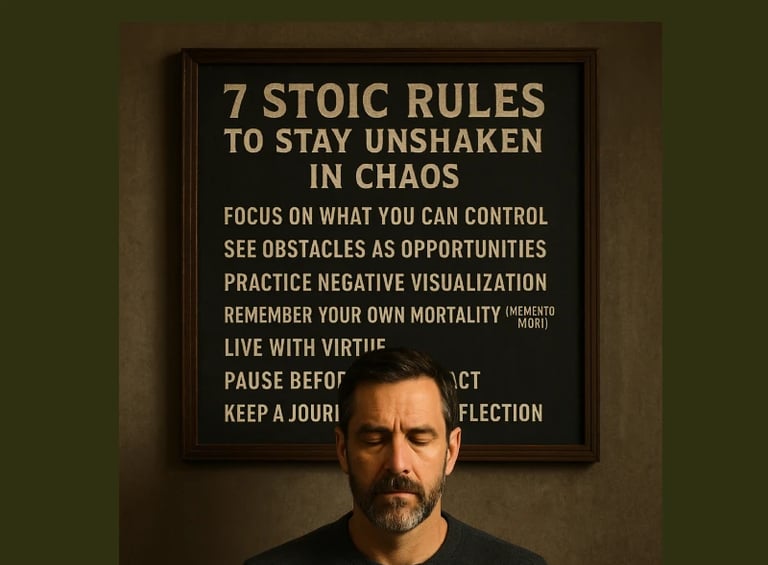7 Stoic Rules to Stay Unshaken in Chaos
Feeling overwhelmed by life's challenges? Discover the 7 Stoic rules to stay unshaken in chaos. This guide uses ancient wisdom to help you build powerful mental strength and find inner peace. Learn simple, practical techniques to face any difficulty with calm and confidence.
MINDSET & PHILOSOPHY
E.O. Francis
6/21/20254 min read


Learning the 7 Stoic rules to stay unshaken in chaos can give you great mental strength. Life often feels confusing and out of control. Events can knock you off balance and fill you with worry. Ancient thinkers called Stoics developed a powerful system to manage these feelings. Their wisdom is not about hiding emotion. It is about understanding it and choosing how to respond. Following these ideas helps you build a strong inner foundation. You can find calm even when everything around you is a storm.
What is Stoicism?
Stoicism is a practical philosophy for a better life. It began in ancient Greece and was popular in Rome. The main idea is simple. We cannot control what happens outside of us. We can only control our own thoughts and reactions. This focus on inner control is the key to finding peace. Stoicism teaches you to be a good person, live with purpose, and face challenges with courage. It is not about being cold or without feeling. It is about being wise and steady.
The 7 Stoic Rules for Inner Peace
These seven rules are your guide to a stronger mindset. They are tools you can use every day. They help you build the mental habits needed to handle difficulties with grace.
1. Focus on What You Can Control
Many of our worries come from things we cannot change. The Stoics taught that you must separate what is in your power from what is not. You cannot control the weather, the economy, or what other people think. You can control your thoughts, your judgments, and your actions. Pouring your energy into what you can change is freeing. It stops you from wasting effort on things beyond your influence. This simple shift in focus brings immense relief and a sense of power.
2. See Obstacles as Opportunities
Problems are a normal part of life. A Stoic does not see an obstacle as just a barrier. They see it as a chance to practice virtue and become stronger. When you face a tough situation, ask yourself what you can learn from it. How can this challenge make you more patient, more brave, or more creative? This mindset turns every problem into a lesson. It helps you grow from your experiences instead of being defeated by them. You start to welcome challenges as tests of your character
3. Practice Negative Visualization
To truly appreciate what you have, imagine losing it. This is the practice of negative visualization. It is not about being gloomy or expecting the worst. It is a powerful tool for building gratitude. Think about your health, your family, or your home. Picture your life without them for a moment. This thought exercise makes you more thankful for what you have right now. It also prepares you mentally for potential loss, making you less fragile when bad things do happen.
4. Remember Your Own Mortality (Memento Mori)
The Latin phrase "memento mori" means "remember you will die." This might sound dark, but the Stoics found it very useful. Thinking about death puts your life into perspective. It reminds you that your time is limited. This thought encourages you to stop wasting time on silly arguments or small worries. It pushes you to live with purpose and to focus on what is truly important to you. Remembering your mortality helps you live each day more fully and with greater meaning.
5. Live with Virtue
For a Stoic, the highest good is living a virtuous life. Virtue is about having excellent character. The four main Stoic virtues are wisdom, justice, courage, and self control. Wisdom is knowing how to act correctly. Justice is treating others fairly. Courage is facing difficulties with strength. Self control is mastering your desires. When you make decisions based on these values, you have a reliable inner compass. External events cannot shake you because your self worth comes from your character, not your circumstances.
6. Pause Before You React
Our first emotional response is often not our best one. The Stoics knew the importance of creating a space between a trigger and a reaction. When someone insults you or something frustrating happens, do not respond right away. Take a breath. Take a moment to think clearly. This small pause gives your rational mind a chance to take over from your raw emotion. It allows you to choose a wise response instead of a knee jerk reaction. This simple habit gives you great control over your own behavior.
7. Keep a Journal for Reflection
Self improvement requires self awareness. A great way to build this is by keeping a journal. At the end of each day, take a few minutes to write down your thoughts. Review your actions. Where did you act well? Where could you have done better? This practice helps you understand your own patterns of thought and behavior. It is a private conversation with yourself that helps you apply Stoic principles to your real life. Regular reflection makes you a better and more mindful person over time.
Putting Stoicism into Practice
Building a Stoic mindset takes time and effort. It is a daily practice, not a sudden change. Do not feel pressured to master all these rules at once. Start with one that speaks to you the most. Perhaps you can focus on what you control for one week. Or you can practice pausing before you react to annoying situations. Small, consistent steps will build a strong foundation. Over time, you will find that chaos has less power over you. You will have the tools to remain steady and unshaken.


Faux Fur Tote Bag


Beats Studio Pro Headphones


Faux Fur Tote Bag
https://www.eofrancispublishing.com/7-signs-youre-burned-out-not-lazy
https://www.eofrancispublishing.com/soft-life-vs-hustle-culture-how-to-actually-live-stress-free
https://www.eofrancispublishing.com/dopamine-detox-how-to-reset-your-brain-in-24-hours
https://www.eofrancispublishing.com/5-body-based-tricks-to-instantly-calm-anxiety
